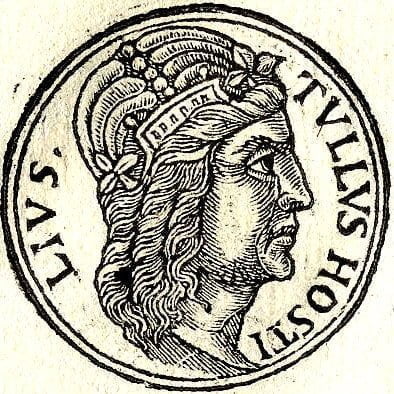Legend of Horatii and Curiatii is a Roman story that tells the history of the rivalry between the cities of Rome and Alba Longa. To avoid the bloodshed of neighbouring settlements, it was decided to resolve the conflict through a duel of the best warriors from two families: Horatii and Curiatii.
In 673 BCE the extremely warlike Tullus Hostilius became the king of Rome. He was the third ruler of Rome according to tradition. According to the Roman historian Titus Livius, Tullus wanted to subjugate his neighbours, including the city of Alba Longa, which was closely related to Rome. The pretext for the war was the competition for cattle and mutual accusations of theft.
Tullus, who sought to start a conflict with the ruler of Alba – Gaius Cluilius – found a clever way to start a war by making it look like the other side was at fault. The king gave up the flock claimed by a rival while keeping the envoys from Alba Longa so long that it appeared that the opponent was greedy and dishonourable. Tullus accused the rival of deliberately exacerbating relations and avoiding an agreement. In this way, there was a war between Rome and Alba Longa.
According to legend, the armies of Rome and Alba fought each other, but no one could gain a decisive advantage. During the war, the current king of Alba Longa died, and a dictator Mettius Fufetius was appointed in his place with unlimited power. To avoid bloodshed, he proposed to Tullus to settle the conflict through a duel between the best warriors. Originally, the chiefs themselves were to fight, but it was agreed that a single fight could not decide the fate of the states.
Finally, three of the bravest soldiers were chosen from each army to fight. Romans chose three Horatii brothers, and Alba residents chose three Curiatii. So it was supposed to be a rivalry between families, which, moreover, were closely related and maintained good relations.
The theme of the superiority of the homeland over the family appears here. Both families had to stand in a deadly fight that decided the fate of Rome and Alba Longa. Titus Livius emphasizes that their fathers, although they knew that they might not see their sons again, were proud of the trust they were given. They blessed those preparing for the clash and took an oath from them that they would fight to the end to give victory to their homeland.
The Horatii and the Curiatii, as cousins, greeted each other and said goodbye before the fratricidal clash. Soldiers from both armies stood around the rival men, who drew their swords and charged into battle. For a long time, neither side could gain an advantage, which proved that the rivals had similar skills and motivations. Over time, both the Horatii and the Curiatii began to feel tired, and the blows began to reach the bodies of the opponents. Two Romans and three Bathers were wounded. Then one of Alba Longa’s warriors surprised the Roman and dealt him a mortal blow. However, he did not enjoy the victory for long, because he was put down by the brother of the murdered Horatius. To him, the adversary knocked out his sword and immediately laid him dead on the ground.
At the moment, there are two Curiatii and one Roman – Marcus, who is the youngest of the siblings. However, he had not suffered any injuries yet, unlike the Curiatii, who were bleeding heavily. Taking advantage of this, he ran away from his opponents, wanting to kill them gradually. First, he killed the first rival whom his brother could not come to the aid of, and then faced the exhaustion from the wounds of the surviving Curatius. He too was knocked to the ground.
The victory of the Romans meant that Alba Longa became a vassal of Rome. The bodies of the defeated brothers were treated with respect, and they were buried on the battlefield in sumptuous tombs.
Marcus, returning home from the war, came across his tearful sister Horatia, who was in despair after the death of one of the Spa guests to whom she was engaged. The latter, furious that his sister is in mourning not for the siblings but for the rival, killed Horatia in passion. The victorious Horatius, striking the blow, said: “Let every Roman woman who dares to despair because of the death of the enemy die like this”. Marcus’ father praised his son for the act, claiming that a daughter would only bring disgrace to their family.
However, according to Roman law, Horatius had to answer for the death of a Roman citizen. The court passed a death sentence on the last Horatius. Marcus’ desperate father gave a touching speech before the king and the assembled people, in which he stated that he could not bear to lose another son and whether the Romans would treat his hero as an ordinary villain. The speech moved the ruler and the people so much that the death sentence was finally abandoned. However, to avoid the anger of the gods, praise sacrifices were made, and Marcus had to publicly pass under the so-called yoke, forcing him to bow his head humiliatingly low.







